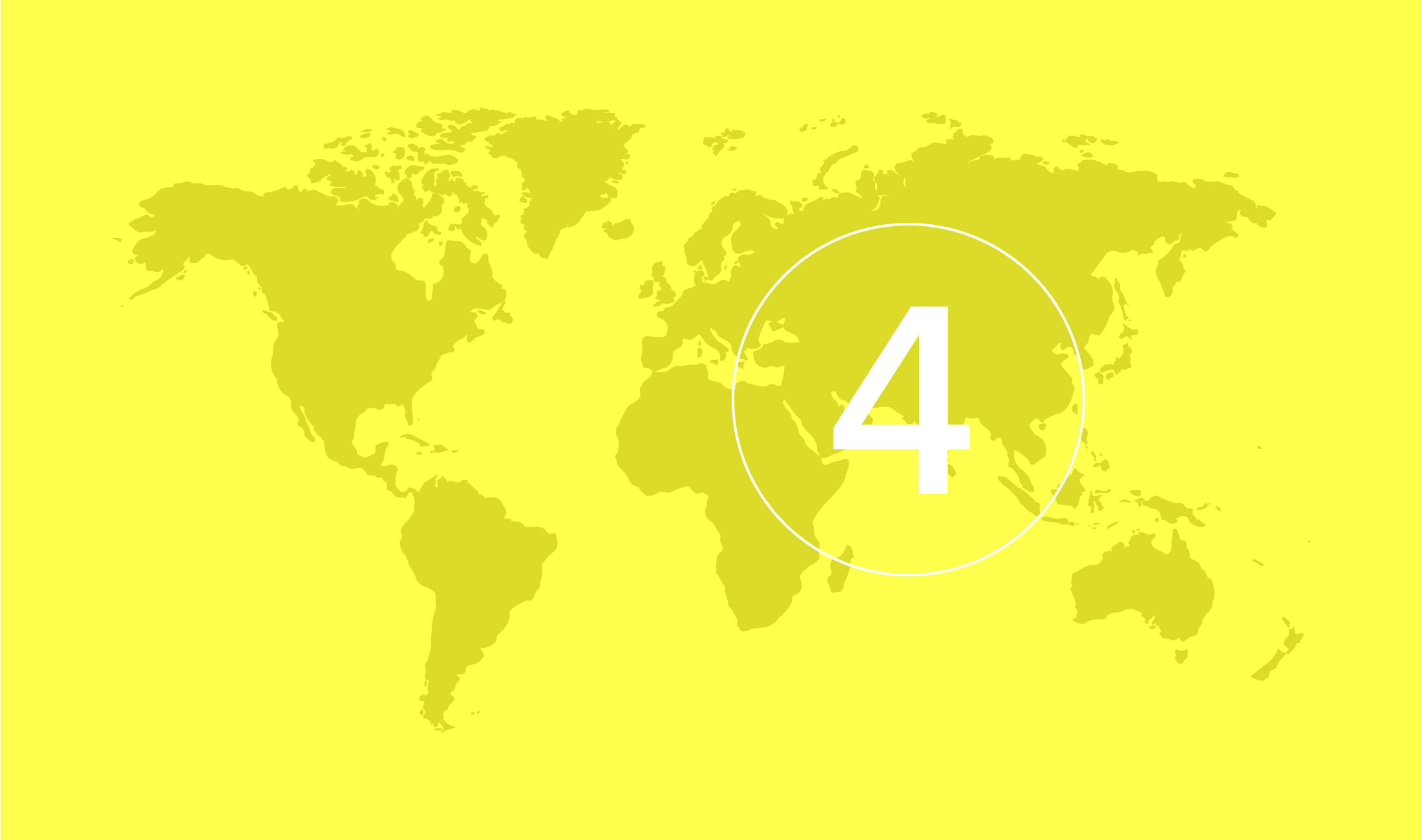
Brazil
Category
4 of 7
| Risk type | Short | Long |
|---|---|---|
| Sovereign | ||
| Public | ||
| Bank | ||
| Corporate |
The icons indicate EKN's risk assessment.
A lower country risk category means a lower country risk. The icons mark EKN's ability to cover risks to different buyers in the country.
-
No policy established
- EKN has not analysed this country recently and therefore has no current opinion. If an exporter submits an application for such a country, EKN performs an analysis of the country at short notice and determines a policy.
-
Normal risk assessment
- EKN decides on guarantee issue based on an assessment of risk in the transaction. There are no predefined restrictions in the risk assessment or assumptions for risk assessment.
-
Restrictive risk assessment
- EKN sets stricter requirements in the risk assessment in order to guarantee a transaction. EKN may have specified special criteria that are key to the risk assessment of the guarantee holder category in question. This may mean that EKN sets a requirement that the counter party must have its own hard currency earnings or that external support can be expected, or that EKN sets a requirement for a letter of credit, government or bank guarantee. If the formulation of the transaction deviates from a defined restriction, we normally set more stringent conditions and may in the worst case refuse to guarantee the transaction. More stringent conditions may be that we reduce the sum guaranteed, raise the premium or require some form of security.
-
Normally off cover
- Here EKN does not normally cover currency transfer risks. However in some circumstances EKN may be able to go further with high risk countries than the restrictions of the country policy indicate. The application is then tested under the so-called GSL facility, which refers to guarantee issue with special country evaluation. There are specific requirements for this, primarily that the exporter has experience of the market in question. The risk is then shared with the exporter and by means of a mark-up on the premium.
-
OECD or EU countries
- Because of EU rules, EKN cannot issue guarantees for transactions with a risk period of less than two years for exports to Australia, EU countries, Iceland, Japan, Canada, Norway, New Zealand, Switzerland or the USA. If you have any questions, please telephone us on +46 8-788 00 00.
Country risk analysis
Country Risk Analysis of Brazil
The latest Country Risk Analysis of Brazil was issued in October 2025.
Latin America’s economic giant
Brazil is the seventh most populous country in the world, with 213 million inhabitants, and the world’s tenth largest economy in terms of nominal GDP. The economy is diversified, with manufacturing, a growing services sector, and substantial natural resources in forestry and agriculture, minerals, metals, hydropower, and oil and gas extraction.
At the same time, the commodities sector remains the backbone of exports; around half consists of iron ore, soybeans, and crude oil. Brazil is Latin America’s largest oil producer and the world’s second largest exporter of iron ore.
The political system is democratic, founded on the 1988 constitution, which marked the transition to civilian rule after two decades of military dictatorship. Since, democratic institutions have been strengthened, although the political system remains fragmented and the formation of governments often requires broad coalitions.
The high public debt is one of Brazil’s principal credit weaknesses. The debt amounts to 90 per cent of GDP – a level that limits the government’s fiscal room for manoeuvre and pushes up interest rates across the economy. Political gridlock has historically hindered the implementation of comprehensive tax reforms. Legally mandated indexation in various areas of expenditure restricts the scope for fiscal consolidation.
The fiscal risk is partly mitigated by the size of the economy, a favourable debt structure and well-developed domestic capital markets. Only just over ten per cent of the debt is external, and only a small share is denominated in foreign currency. Brazil’s central bank operates independently in line with an inflationtargeting framework, while the country’s substantial foreign reserves and flexible exchange rate serve as buffers against external shocks.
Brazil is well positioned in key sectors for the global energy transition. The country has an unusually green energy mix – nearly half of its primary energy and over 80 per cent of its electricity already come from renewable sources, compared with global averages of 15 and 27 per cent respectively. In addition, Brazil possesses extensive reserves of strategic minerals and metals. According to the US Geological Survey, Brazil holds the world’s second-largest reserves of rare earth elements after China, although production is still limited.
At the same time, Brazil is highly exposed to risks associated with climate change. Deforestation in the Amazon, droughts in central agricultural regions, and recurring extreme weather events are likely to become increasingly severe – as illustrated by the recent years’ Amazon forest fires and the major flooding in the state of Rio Grande do Sul in 2024. The pace of deforestation declined during 2023 and 2024, but these gains risk being undermined by droughts and wildfires intensified by climate change. The World Bank estimates that extreme weather events such as droughts, flash floods, and urban river flooding already cost Brazil an average of USD 2.6 billion per year, equivalent to 0.1 per cent of 2022 GDP levels.
Another characteristic of the Brazilian market is its high import tariffs and complex regulatory framework, which have long hindered foreign firms’ market access. Gradual progress in opening up the economy has nevertheless taken place, including through liberalisation in the services sector. In this context, a future free trade agreement between the EU and Mercosur – the trading bloc to which Brazil belongs – could play a key role. The agreement is expected to enhance transparency and predictability, facilitate trade between the parties, and contribute to Brazil’s deeper integration into the global economy.
A political agreement on the negotiated text has been reached between the parties. The next step is the ratification process, which requires approval by both the EU and Mercosur. If the agreement includes areas that fall within the competence of the EU member states, approval will also be required from national – and in some cases regional – parliaments within the EU.
Strong economy amid fiscal strain
The Brazilian economy has demonstrated resilience amid the turbulence of recent years in the global economy. Growth has averaged between 3 and 3.4 per cent per year over the past three years, supported by favourable oil and gas prices and a robust labour market. At the same time, high economic activity, combined with droughts that have pushed up food prices and periodic currency depreciations, has generated inflationary pressure. According to the IMF’s latest forecast, inflation is expected to reach 5.3 per cent in 2025, exceeding the central bank’s target of 3 per cent with a tolerance band of ±1.5 percentage points. To counter this, the central bank has pursued a very tight monetary policy.
While several of the region’s central banks have begun their rate-cutting cycles, Brazil’s central bank has moved in the opposite direction. The policy rate reached 15 per cent in September 2025. Going forward, inflation is expected to ease as energy prices gradually fall and global demand weakens. This could pave the way for a cautious reduction in the policy rate during 2026. In the coming years, the economy is expected to lose some momentum, with annual growth around 2 per cent, while inflation is forecast to reach the target level by 2027.
The high interest rate environment in recent years has also weighed on the government’s financing costs. Public debt is projected to exceed 90 per cent of GDP in 2025, according to IMF forecasts, with around 20 per cent of total government expenditure devoted to interest payments. Despite significant progress in reducing the primary deficit (the fiscal balance before interest payments) by the equivalent of 2 per cent of GDP since 2023, high interest rates have driven up the overall budget deficit. Indexation and limited flexibility to adjust various expenditure areas have further constrained fiscal tightening.
Counterbalancing these risks is the continued favourable structure of government debt, characterised by a low share of external debt and only a limited portion denominated in foreign currency. This provides protection against exchange rate fluctuations and speculation in international capital markets.
Limited US exposure. Elections ahead
The impact of US tariffs on the Brazilian economy is expected to be muted. Brazil is a relatively closed economy with low direct exposure to the United States, and several of its export goods are exempt from the new US measures. Brazil’s efforts to diversify its export markets are also expected to mitigate the effects over time.
However, indirect consequences cannot be ruled out. A weakening of global – and particularly Chinese – demand could significantly affect Brazil’s export revenues. China now accounts for just over 30 per cent of the country’s exports (2023).
In October 2026, Brazil will hold general elections. Luiz Inácio Lula da Silva of the Workers’ Party has served as president since 2023, leading a centre-left coalition. It remains to be seen which right-leaning candidate will challenge him. Former president Jair Bolsonaro (2019–22) is legally barred from running, having been sentenced by the Supreme Court to 27 years in prison for an attempted coup (although he may serve his sentence under house arrest for health reasons). The election year may be characterised by occasional financial market volatility, particularly if the budget deficit widens ahead of the election and inflation fails to move towards the target range.
Business environment
Access to financial information in Brazil is generally good. Imports on open account are common, and EKN’s experience has overall been positive. The use of letters of credit in export transactions has traditionally been low. Private property rights are respected and well defined. The regulatory environment is considered relatively sound, as technical and economic considerations, rather than political ones, tend to guide government decisionmaking.
The complex and opaque tax system has historically acted as a brake on business activity, as has the country’s inadequate infrastructure, which often creates bottlenecks in supply chains and contributes to inflation. However, the tax system is set to be simplified through the 2023 tax reform and the introduction of a unified VAT, although implementation will take time. The complicated legal system also makes legal proceedings lengthy and costly.
According to the World Bank’s Governance Indicators, Brazil’s institutional quality has weakened over the past decade, particularly in relation to corruption control and government effectiveness.
The Brazilian banking system is generally resilient. The sector is well capitalised, profitable and liquid, and has proven capable of withstanding short-term shocks. It remained stable and resilient throughout the pandemic, demonstrating its underlying strength. The proportion of non-performing loans declined after peaking in mid-2023 and remains at manageable levels. The five largest banks dominate the market, accounting for over 60 per cent of total banking assets.
The federal government plays a central role in the sector through ownership of the country’s largest banks – Banco do Brasil, Caixa Econômica Federal and several development banks (including BNDES). Together, state-owned banks account for around 40 per cent of total sector assets. Foreign ownership is more limited, representing only a small share of assets, mainly through Banco Santander. Historically, state-owned banks have been able to offer subsidised credit to politically prioritised sectors, resulting in reduced competition and inefficient capital allocation.
EKN’s business assessment also takes into account the risk of negative impacts on human rights. EKN’s focus is on the potential impact of the operations in which the exported goods will be used. Issues such as working conditions, child and forced labour, excessive use of force by security personnel, indigenous rights and land rights are therefore of particular importance.
In terms of the risk of human rights violations relevant to business activity, Brazil ranks highest for land rights, indigenous rights and forced labour among the categories included in Maplecroft’s index. Land rights concern the risk of forced displacement and inadequate compensation, while forced labour refers to work performed involuntarily or under coercion.
Indigenous rights measure the degree of obstacles indigenous groups face in exercising their traditional rights to land and livelihoods, as well as their right to free, prior and informed consent (FPIC) in situations where those rights may be affected by corporate activities. The risk level for restrictions on freedom of association and collective bargaining is somewhat lower in Brazil than the average for upper-middle-income countries.
EKN’s policy
There are no specific restrictions regarding transactions with the state, banks, or the private sector, which means that transactions are assessed on their own merits without special requirements or conditions. For transactions involving public buyers, EKN requires a letter of credit, a sovereign guarantee, or a bank guarantee in order to consider risk cover.
EKN’s commitment and experience
EKN’s outstanding guarantees amount to just over SEK 53 billion, consisting largely of an export transaction relating to the JAS Gripen aircraft. The remaining exposure is spread across several sectors, with the pulp and paper industry dominating.
Overall, the payment record is good. EKN currently has no outstanding payment delays. However, indemnity payments have occurred in transactions involving public buyers. Outstanding claims amount to SEK 63 million and relate to commercial losses in around 20 transactions carried out between 2001 and 2018.
More for companies that want to export to Brazil

EKN's guarantees
EKN's guarantees reduce the risk of payment defaults and help banks support businesses. Which guarantee suits your needs?
EKN's guarantees
Guarantee guide
Are you unsure which guarantee is the best fit for your specific transaction? Try our guarantee guide.
Guarantee guide